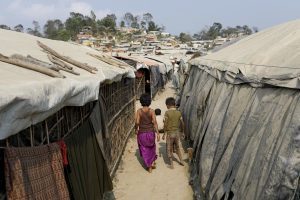Another 140 Rohingya refugees arrived in Indonesia’s North Sumatra province over the weekend, adding to a surge of arrivals that has created tensions with local communities. According to Reuters, which cited a report from the state news agency Antara, the group, consisting mostly of women and children, arrived by boat in North Sumatra’s Deli Serdang regency, close to the city of Medan, late on Saturday.
The boat is the latest in a surge of arrivals in Indonesia, where increasing numbers of Rohingya refugees are seeking sanctuary from the stifling, unsanitary and crime-ridden refugee camps of southeastern Bangladesh.
According to the United Nations refugee agency UNHCR, more than 1,500 Rohingya refugees have arrived in western Indonesia since mid-November, most of them in Aceh, on the western tip of Sumatra.
The spike in perilous ocean journeys is a sign of the increasingly desperate conditions in the refugee camps of southeastern Bangladesh, which are home to nearly 1 million people. Most of them are Rohingya civilians who fled to Bangladesh in August 2017, when the military launched a “clearance operation” in northern Rakhine State in response to scattered attacks by Rohingya militants.
The offensive, which has been described both as “genocide” and a “textbook case of ethnic cleansing,” saw Myanmar soldiers and local vigilantes kill at least 6,700 people and expel more than 740,000, while shooting livestock and torching dozens of villages.
Rohingya asylum seekers have been setting off on leaky and dilapidated boats for years, with western Indonesia and Malaysia being the most common destinations. Previously, they have been met with hospitality in devoutly Islamic Aceh, at least outwardly. However the growing numbers of arrivals in Aceh has strained relations with local communities.
“There are still many poor people here. Why should we take care of thousands of Rohingya who cause many problems?” Reuters quoted one local resident of Pidie in Aceh as saying last month. “They have a bad influence. Some of them escape, and engage in sex outside of marriage and drugs.”
On December 19, around 200 people held a protest in Sabang island, off the western tip of Aceh, where two boats of Rohingya refugees landed on November 21 and December 2, requesting their deportation.
Then, on December 27, hundreds of university students went further, storming a temporary shelter for Rohingya refugees in a convention center in Aceh’s capital Banda Aceh. According to the AFP news agency, “videos of the incident showed the students, many wearing jackets with different universities’ insignias, running into the convention centre’s basement, chanting ‘Kick them out’ and ‘Reject Rohingya in Aceh’.”
In a statement, UNHCR stated that the incident had “left refugees shocked and traumatized,” adding that it remained “deeply worried about the safety of refugees and calls on local law enforcement authorities for urgent action to ensure protection of all desperate individuals and humanitarian staff.”
The popular opposition to the arrivals has licensed the Indonesian government to take a similarly chilly stance. Last week, the Indonesian military announced that a navy vessel had driven away a boat carrying Rohingya in waters further north off Sumatra.
While President Joko Widodo has pledged to work with international agencies to house the new arrivals temporarily, his government has stated that it is not a signatory of the 1951 Refugee Convention, and therefore has no obligation to do so, let alone to provide a permanent solution.

































